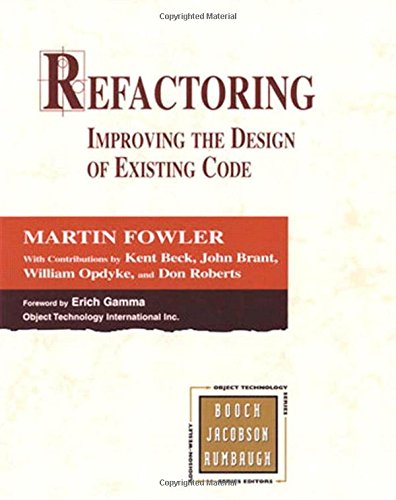Refactoring: Improving the Design of Existing Code pdf free
Par freeman albert le samedi, mars 18 2017, 08:32 - Lien permanent
Refactoring: Improving the Design of Existing Code. Don Roberts, John Brant, Kent Beck, Martin Fowler, William Opdyke

Refactoring.Improving.the.Design.of.Existing.Code.pdf
ISBN: 0201485672,9780201485677 | 468 pages | 12 Mb

Refactoring: Improving the Design of Existing Code Don Roberts, John Brant, Kent Beck, Martin Fowler, William Opdyke
Publisher: Addison-Wesley Professional
Over the last few years, I've succumbed to an unfortunate addiction - that of writing books. The next book I'll probably get, since I have heard good things about it, is “Refactoring: Improving the Design of Existing Code”. In this post I'll discuss some of the disadvantages of modules, and suggest that Ruby programmers should see them as a method of last resort for code sharing only after carefully considering alternative approaches such as creating classes. Guided by Tests” location 1258; M. Fowler, “Refactoring: Improving the Design of Existing Code” location 3320; B. Also consider reading Martin Fowler's “Refactoring: Improving the Design of Existing Code”. Martin, “SRP: The Single Responsibility Principle”, http://www.objectmentor.com/resources/articles/srp.pdf. It was the first I've read related to “clean code”. Refactoring Ruby Edition · Analysis Patterns · Planning Extreme Programming. The concept of 'Code smells' was popularized by Kent Beck and Martin Fowler in the book 'Refactoring: Improving the Design of Existing Code' (ISBN 978-0201485677). I started with the “Clean Code” book by Robert Martin since I was on a limited budget. It changed the way I am writing code. This book is an extensive compilation of refactorings that range from providing meaningful names for variable to collapsing class hierarchies. Refactoring: Improving the Design of Existing Code 重構:改善既有程式的設計.